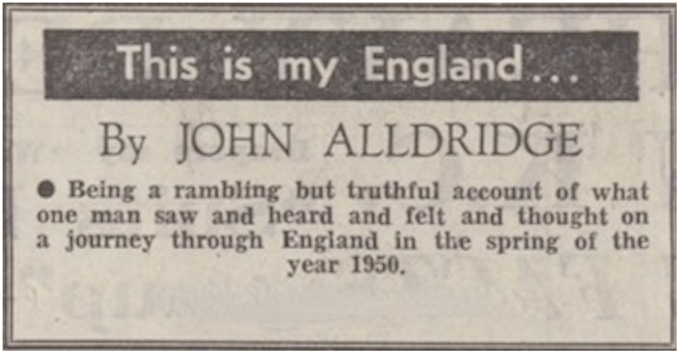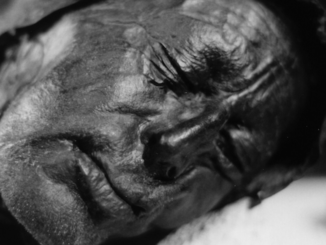
This Is My England,
© 2022 Newspapers.com
I have had a particularly soft spot in my heart for Nottingham ever since an evening in June, 1940.
There were about a thousand of us, dribs and drabs of a British Expeditionary Force, scooped up unceremoniously by the Navy at St. Nazaire and dumped anyhow on the Princes Pier at Liverpool.
From Liverpool they carted us to Leicester, where we slept on the grass in the public park. By the time we shuffled into the courtyard of Nottingham Castle any resemblance between us and soldiers had become purely coincidental.
We were the rag-tag-and-bob-tail of a beaten army. And we were acutely aware of it. And then the miracle happened. Nottingham met us with a brass band. They hung the flags out and treated us like conquering heroes.
And that night, for the first time for a week, I went to sleep in a bed while a motherly Nottingham housewife clucked sympathy as she tucked me in.
(I have just met her again: dear, delightful Mrs. Green. A little older; a little plumper, perhaps. But still the very soul of hospitality and the best hand with a batter pudding in five counties.)
I include this purely personal reminiscence because it is a good example, I think, of how these warm-hearted Nottingham folk will react in an emergency.
I happen to know, for instance, that Mr. Green, a long-distance lorry driver, who needed his sleep every bit as much as I did, gave up his bed to me that night.
And the same sort of thing was going on in working-class homes in many parts of Nottingham.
In fact, Nottingham is a good place to make for if the immediate future looks pretty bleak.
It was Nottingham which took pity on poor old James Hargreaves after a Bolton mob had smashed his machine and driven him out of the town.
And, as a result, Nottingham got the first cotton mill in the world.
Not that a soft head goes with a soft heart round here. These ironstone hills, for all their deceptive greenery, don’t breed fools. Nor do they suffer fools gladly.
A Nottingham crowd in a bad temper is something to steer clear of. It’s not much more than a hundred years since a Nottingham crowd in a very bad temper indeed swarmed up to their grim old castle perched on its incredible, improbable rock, and burned it to the ground.
But Nottingham folk are a sociable lot. You can hear better talk in the city’s innumerable pubs and “vaults” than in any other city of the British Isles except Dublin.
It’s not for nothing that the city claims the prettiest women, the oldest inn, and the best beer in England.
Nottingham may, or may not, have the prettiest women in England. But certainly it has the busiest. I have never seen so many young women — with hardly a man among them — hurrying purposefully to work at the same time.
It used to be said that a Nottingham lass could always pick up a husband at the factory gates: that was thirty or forty years ago, when curtains of Nottingham lace discreetly veiled every respectable parlour window.
Now the lace industry — like a good many other things — is not quite what it was.
But that has not had the slightest effect on the average Nottingham young woman’s determination to earn her independence at all costs. Nowadays she turns her hand to a surprising variety of things.
For instance, not so long ago she was helping to produce one-third of all the penicillin in the Old World.
Through her nimble fingers pass 10,000,000 cigarettes a day, and not one of them so much as touched by hand. (Which is Irish, but accurate.)
And she is largely responsible for flooding the export market with British all-steel bicycles at the rate of three a minute all the year around.
It seemed to me, watching them wheeling away in troops and squadrons, that there must be more bicycles being pedalled around Nottingham and its hilly suburbs than in any other city in Britain.
You realise why that might very well be so when you go out to Lenten Boulevard, where are the headquarters of Raleigh Industries, which cover nearly forty acres and employ some 7,000 men and women, most of whom, from the managing director downwards, come to work by bicycle.

Raleigh bicycle Nottingham badge,
Raleigh UK – Public domain
Like so many of these mammoth Nottingham organisations Raleigh Industries started in a small way a comparatively short time ago.
In 1887 Frank Bowden, a colonial civil servant who had spent most of his life in Hong Kong, was sent home officially on sick leave, unofficially to die.
As a last resort he went for advice to a Harrogate doctor, who told him bluntly to ride a bicycle. He did — every day for six months. And instead of dying he lived to found an industrial empire.
For he traced the machine that had saved his life back to a small shop in Raleigh Street, Nottingham, where twelve men were turning out three bicycles a week. He took it over, financed it, and founded the Raleigh Cycle Co.
Today, thanks to the unconventional advice of that Harrogate doctor, more and more Bedouin Arabs and Chinese coolies are riding about their lawful occasions on gold and scarlet bicycles with the words “Nottingham, England” stamped indelibly on them.
Statistics are confusing things: and the young man who took me around (he used to be a reporter on a national newspaper, but exchanged it for a job that brought him into daily touch with the thing he loves best in this world — cycling) wisely refrained from giving me any.
But it is a fact worth mentioning that last year the number of bicycles turned out by this vast plant for export only exceeded by 100,000 machines the total production for 1939.
It all looks delightfully casual and simple work they do here — particularly in the enamelling shop — until you learn that scores of individual parts, big and small, go to make up a bicycle. And that doesn’t include all the rubber and leather bits and pieces.
I watched a pretty young woman briskly sticking transfers on bicycle frames at the rate of 200 an hour. Her fingers moved like swift, unerring little machines.
But her thoughts were obviously miles away: with Donald Peers, perhaps, or Alan Ladd.
For her 44-hour week this young woman earns an average weekly wage of £3 18s.: next year, when she is 18, she will be “on her own time” and earn as much as she can make. Her charge hand, she told me, is able to stick on 1,900 transfers in a day and therefore earns up to £6 a week.
Incidentally it’s worth noticing that three months ago this young woman was earning £2. 11s. as a dryer in a lace works. But nowadays lace manufacturers can’t afford to compete with the added incentives of spring-floor ballrooms, acres of playing fields, and free trips to Blackpool.
I should have liked to have stayed in Nottingham to watch the outcome of the fascinating controversy which is going on between some of the city’s most learned pundits over Robin Hood.
It seems a year or two ago a local industrialist — by a delightful chance a successor to Robin’s traditional enemy, the Sheriff of Nottingham — offered a statue in memory of bold Robin, to be erected on some central site in the city.
Since there seems to be grave doubt as to whether the great hero ever, in fact, existed — though protagonists have produced a vast amount of evidence for and against — the problem seems to boil down to this: Can you erect a statue to a legendary character?
Personally I don’t see why not. Every foreigner — and that means everyone who was not born within five miles of Trent Bridge — wants to hear about Robin the moment he has arrived in the city.
And if Coventry can have its equally legendary Lady Godiva immortalised in marble, why should not there be a memorial to the lad in Lincoln green?
If there was no more time left for Robin at least we were able to leave by way of his one-time happy hunting ground, Sherwood Forest.

Statue of Robin Hood in Sherwood Forest,
Nilfanion – Licence CC BY-SA 4.0
And if Nottingham folk can’t be sure of Robin, they can be absolutely certain about Sherwood, which, among other things, has lent its name to a famous football team, to one of the grandest fighting regiments in the British Army, and to a whole new suburb.
Sherwood once upon a time covered 200 square miles and stretched as far as Worksop. It is now a shadow of its old self. But it is still fighting hard for survival.
In fact, on the road from Nottingham to Mansfield you can’t fail to notice the indomitable way it has of suddenly bobbing up apparently from nowhere; no longer sturdy oak and ash, it’s true, but wiry little plantations of larch and pine.
And you will notice, too, how they are putting these new extensions of the old lawless forest to a respectable use.
In one new plantation there’s an orthopaedic hospital, almost hidden in the trees.
And if you want to see how delightful even a mining village can be if properly planned you should take a look at Clipstone, which is right on the edge of old Sherwood and only a few hundred yards from the grim little hunting box which King John built for himself.
But the heart of the old forest proper is at Edwinstowe; it was here, in the little parish church, according to the legend, that Robin Hood married Maid Marian.
And it was here that we met Police Constable Leslie Abbott who has one of the most romantic beats in England — 9,800 acres of Sherwood Forest.
I’m not going to be whimsical and pretend that Constable Abbott knows every one of his trees by name. But he does know a surprising lot about woodcraft and forest lore.
He introduced us, for instance to the cuckoo birch, which is a blithe young birch growing out of the hollow trunk of a long-dead oak. And we went with him meet his most famous charge, the Major Oak, which is believed to be 1,500 years old and therefore easily the oldest oak in England.
If Robin Hood ever really lived there can be no doubt that he knew that tree — which would have been an old tree even then. And reckless character that he no doubt was — or might have been — he would at least have left the old tree in peace.
And he would not have maimed and tortured it — for it is still alive, and showing a new green overcoat just now – as do those young oafs who come out from Nottingham each weekend to carve their silly names on it and dare each other to break off a branch.
For they do these things still in Merrie England: they belong to the same gay fellowship who steal paltry little ashtrays from country pubs and have to be told how to behave in country churches.
They are the new vandals: the senseless despoilers of beautiful things, beside whom Attila was a parfait gentil knight.
Reproduced with permission.
© 2022 Newspapers.com
Jerry F 2023



